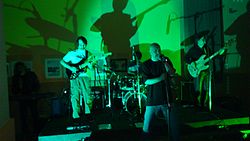2007-present
In 2007 the band reunited. [2] The new lineup, beside Pejović and Jović, featured former Vampiri member Saša Petrov (guitar) and Milan Milić (trumpet). [2] The band recorded the album Trenerka i sako ( Suit Jacket and Tracksuit ), released in 2011 through Long Play. [4] The album was produced by the band members themselves. [4] On the album recording, keyboards were played by Jović, and bass guitar was played by both Jović and Petrov. [4] The album featured the song "Pokloniću joj nebo" ("I'll Give Her the Sky"), [4] written by Pejović and originally recorded by Vampiri on their 1993 album Be-Be (Ba-Bies). [5]
Soon after the album release, Jović left the band. The new lineup, beside Pejović, Petrov and Milić, featured former Prljavi Inspektor Blaža i Kljunovi and Alisa member [6] Dejan Resanović (bass guitar), former Karizma and Vampiri member [7] Dejan Tomović "Tomke" (keyboard) and Nenad Đorđević (drums). [2] After only several promotional performances, Milić left the band, and the rest of the lineup recorded the live album Uživo iz kluba "Fest" (Live from the Club Fest) in December 2011, in Belgrade's Fest Club. [8] The album, produced by Vladimir Novičić, was released in early 2013. [8] Beside The Dibidus songs, the album featured Familija songs "Paranoja" ("Paranoia"), "Crno, belo, šareno" ("Black, White, Colorful"), "Nije mi ništa" ("There's Nothing Wrong with Me"), "Boli me kita" ("I Don't Give a Fuck") and "Mala, mala" ("Little, Little"), and the bonus track "Draga" ("Darling"), a duet recorded with Neno Belan. [8]
In 2017, the band released the song "Ni pakao ni raj" ("Neither Hell nor Heaven"), originally recorded in 2013. [9]
